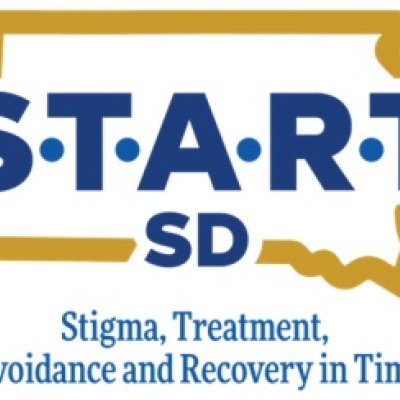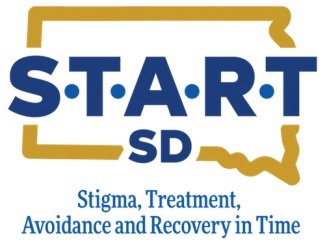
START-SD is a federal program funded by the Health Resources and Services Administration (HRSA) working to increase access to and effectiveness of prevention, treatment, and recovery services for substance use disorder in South Dakota. It is a three-pronged project, with focuses on opioid use disorder, psychostimulant use disorder, and overdose response.
The first prong of the START-SD project is designed to increase access to prevention, treatment and recovery services for substance use disorders with a focus on opioid use disorder in Brookings, Codington and Hughes Counties in South Dakota. Our goal is to slow the opioid epidemic and help impacted individuals and families get the care they need to thrive. In addition, we are hoping to increase use of Medication Assisted Treatment (MAT) for patients with opioid use disorder. See the video below for more information.
Project team members from South Dakota State University have partnered with Center for Family Medicine in Sioux Falls, Project Recover in Rapid City, Brookings Behavioral Health and Wellness in Brookings, Capital Area Counseling Services in Pierre, Lutheran Social Services, and Face-It TOGETHER, which is based in Sioux Falls. By working with these organizations and providers, the START-SD team will achieve its objectives.
The START-SD Approach
| Prevention | Treatment | Recovery |
|---|---|---|
| Public and Family Awareness | Telehealth MAT Services | Peer Coaching |
| Anti-Stigma Campaign | Provider Training/Mentorship | Counseling |
| After-school Education | Project Echo | Discharge Coordination |
| Naloxone Access | Counseling and Case management | Referrals |
| Drug Take Back | Reimbursement Training | Support Groups |
| Increased Screening |
This work is being completed with the help of our key partners
As a family medicine clinic, CFM is committed to utilizing multiple modalities through their well-established primary care approach. This allows CFM to treat patients for all of their health care needs, including acute and chronic disease management, prenatal care, and substance use. In the area of substance use, CFM focuses on medication-assisted treatment (MAT). MAT is most effective when a patient commits to change, and their primary care focuses on "whole-person" health. This model addresses all patient needs by combining traditional medicine and behavioral therapy. CFM's team consists of physicians, therapists, a pharmacist, and a nurse case manager. They also collaborate with local behavioral health organizations to ensure patient needs are met.
PR is the leading provider of telehealth SUD services throughout the state. The center is located in Rapid City, SD, and led by Dr. Steven Tamang, who has been a champion for MAT services throughout the state. PR was formed to address the gap in access to MAT providers throughout the state which remains a key issue. They currently have nine providers with a DATA 2000 waiver and are taking on new patients. PR will provide telehealth services to patients enrolled in the START-SD program as well as provide technical expertise and mentorship to local provider.
BBHW is a privately owned, non-profit 501(c)(3) community mental health center and community substance abuse treatment center accredited by the State Division of Behavioral Health. BBHW serves all of the state funded patients in Brookings County and provides a wide variety of counseling, prevention education and case management services. BBHW is led by their CEO, Mary Beth Fishback and has established themselves as a leader addressing mental health in the community. This has included being a key member of the Brookings Mental Health Coalition and Brookings Area Mental Health Task Force. The staff at BBHW includes a Physician Assistant, licensed clinicians, LPN and multiple Case Managers. This team will provide a full continuum of services, wrap around and recovery supports.
LSS of South Dakota is a faith-based organization working to respond to changing needs in South Dakota communities. Their mission is “Inspired by God's love, we care for, support and strengthen individuals, families and communities.” LSS touches the lives of South Dakotans 45,781 times each year with a variety of programs and services statewide. LSS is one of the largest private non-profit human service agencies in South Dakota and they have offices in each of the target communities. LSS serves people of all ages, faiths, races and economic status with professional, confidential and affordable services. LSS is committed to hiring a Care Coordinator to assist patients and families impacted by OUD to receive the needed medical and social services.
FIT is a nationally-focused addiction wellness nonprofit that provides professional peer coaching to those impacted by addiction, including loved ones. Their mission is to get people with addiction and their loved ones well. By pairing members (clients) with coaches who have similar lived experiences, they are welcomed into a safe, nonjudgmental space where they can begin to overcome the challenges in their lives related to addiction. Coaches meet members at any point in their journeys. They offer guidance in a personalized way. Members don’t have to follow a one-size-fits-all program or remain sober to stay engaged with a FIT coach.
CACS has been providing services since 1968. They are accredited by the State of South Dakota as a mental health, addiction treatment and child welfare agency. They serve youth, families, adults and seniors. The agency employs over ninety employees, who provide services in their offices or in the community, such as at schools throughout the area. They provide a variety of SUD services through their highly trained staff. CACS serves the nine counties of Hughes, Stanley, Haakon, Jones, Lyman, Buffalo, Hyde, Sully and Potter.
Project Manuscripts
Funding Statement
This project is supported by the Health Resources and Services Administration (HRSA) of the U.S. Department of Health and Human Services (HHS) as part of a financial assistance award totaling $1,000,000 with 100% percentage funded by HRSA/HHS. The contents are those of the author(s) and do not necessarily represent the official views of, nor an endorsement, by HRSA/HHS or the U.S. Government. More Information
Program Directors
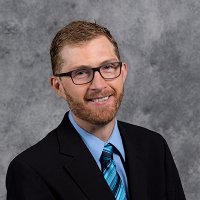
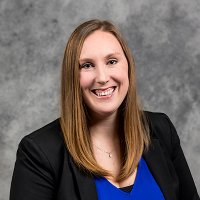
Erin Miller
Interim Center Director, Community Practice Innovation Center (CPIC), Assistant Professor, Department of Allied and Population Health
Department of Allied and Population Health
Community Practice Innovation Center
College of Pharmacy and Allied Health Professions
SDSU - Sioux Falls
Faculty

Patricia Ahmed
Assistant Professor
School of Psychology, Sociology and Rural Studies
Community Practice Innovation Center
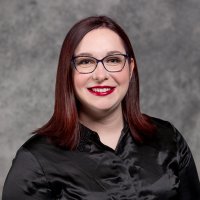
Stephanie Hanson
Population Health Instructor
Department of Allied and Population Health
Community Practice Innovation Center


